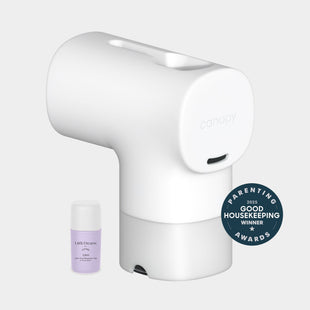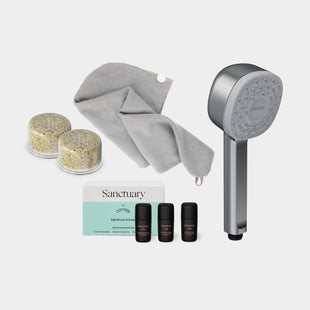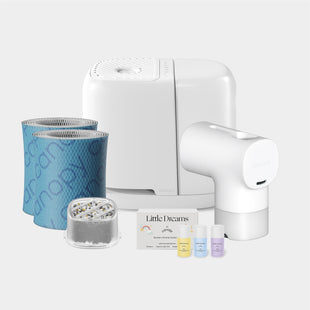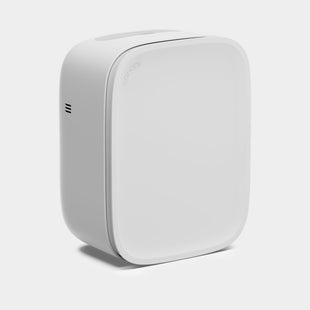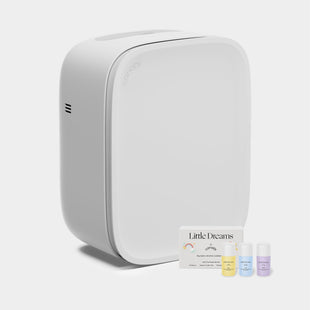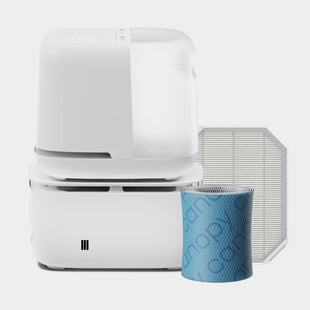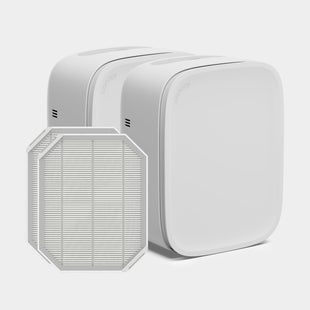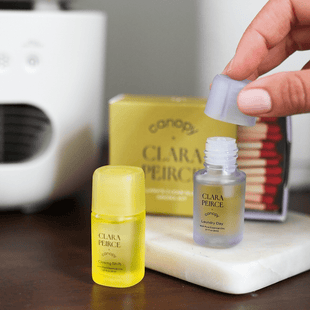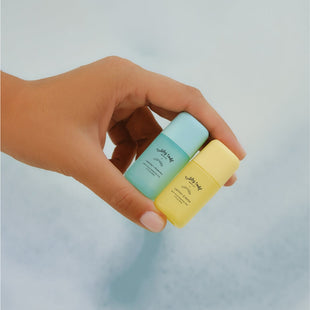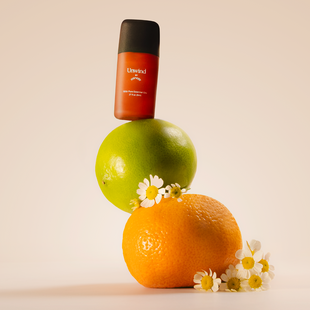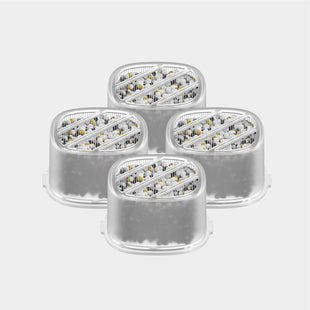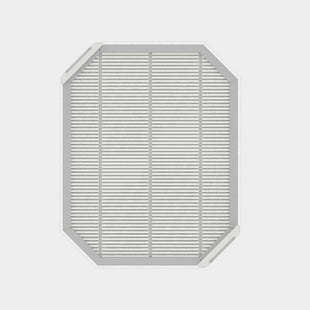We can see it now: you make it through an entire day unscathed, with no allergy symptoms, a well-lubricated nose and throat, and crystal clear eyes. You rejoice in a successful day without allergy symptoms only to experience a fragmented night’s sleep with a stuffy nose through the night, and a frustrating dry throat that just won’t quit.
Why do allergy symptoms get worse through the night? Can allergies make you tired? Why do you get a stuffy nose at night or a splitting headache in the morning?
In this blog, we will answer all of your burning questions about nighttime allergies.
What Triggers Nighttime Allergies?
Nighttime allergies are triggered by a number of factors. Most often, nighttime allergies are caused by a buildup of allergens present in your sleeping area including dust mites in your bed, mold in the dark crevices of your bed frame, or pet dander on your comforter from your furry friend.
But, not all nighttime allergy symptoms are caused by allergens physically brought into your home. Sometimes, allergens invade your space accidentally through open windows, your HVAC unit, or through open doors.
Symptoms of Nighttime Allergies

Nighttime allergies may look different from person to person. The most common nighttime allergy symptoms are:
- Nasal congestion at night
- Runny or itchy nose
- Coughing or wheezing
- Sore or dry throat
- Headache upon waking
A common question asked by allergy sufferers is: can allergies make you tired? While fatigue is not a direct symptom of allergies, the aforementioned allergy symptoms can largely impact your sleep cycles, which interfere with the quality of your sleep. The result of fragmented sleep is fatigue throughout the day. If you suffer from any of the symptoms listed above regularly, you may be having an allergic reaction to the allergens present in your home.
What Type of Allergies Worsen at Night?
Not all allergies worsen in the evening and into the wee-hours of the morning. There are 4 common allergies that aggravate an already stuffy nose at night, trigger a persistent cough, make your eyes itch, or leave you with a daunting headache upon waking. These include: pollen allergies, pet dander allergies, dust mite allergies, and mold allergies.
Pollen Allergies / Hay Fever
Hay fever is a type of allergy triggered by exposure to pollen by way of trees, weeds, shrubbery, and grass. Pollen is most highly concentrated in the air at dawn, so if you regularly wander onto your patio for your morning cup of coffee or take a stroll through your neighborhood to let your dog relieve him or herself, you may suffer from exacerbated allergy symptoms directly after this activity.
Recent research from the Aeroboliogia presents new information regarding pollen count throughout a 24-hour day. It was generally believed that pollen count is the highest at dawn with higher levels of pollen throughout the day and a dip in pollen count in the evening hours. Scientists found that while pollen count is higher during the day for certain pollen types, other pollen types including mugwort, grass, birch, and ragweed were higher or remained the same during the evening hours.
If you sleep with your windows open at night for a bout of fresh air, pollen may be entering your home and resting on your bedding and pillows without your knowledge causing a flareup of allergies through the night.
Pet Dander

Your furry friends are loyal companions, and you couldn’t possibly love them more. There is nothing like unconditional love from a pet.
While your four-legged friend is a trusty sidekick, they do produce ample pet dander that could trigger an allergic reaction. If your dog or cat cozies up next to you in bed, this may cause worsening nighttime allergy symptoms. Even if you do not have a pet in your home, pet dander can enter your space through open windows, open doors, the soles of your shoes, and your clothing. There are simple ways you can prevent pet dander from interfering with your evening snooze, which are listed in the next section.
Dust Mites
Dust mites are microscopic bugs that feed off dead skin cells, which is why they are most commonly found on sheets, pillows, and any bedding material exposed regularly to bare skin. What a horror story!
Dust mites do not bite nor spread disease, but they do leave droppings that may trigger allergic reactions in those who suffer from dust mite allergies. Dust mites prefer warm environments and thrive in bedrooms, specifically in carpet, on rugs, on mattresses or box springs, and in sheets and bedding. These bugs can trigger allergy symptoms in both asthmatics and people who suffer from a dust mite allergy.
Mold
Mold is a fungi that, in its natural habitat, plays a significant role in the cycle of life by disintegrating decayed, organic matter. Indoor mold can be caused by mold spores traveling through opened windows and landing on surfaces, persistent water leaks, water damage, or a number of other factors.
Mold thrives in dark, damp locations that receive little to no attention like behind your bed, under sinks, or in dark crevices in your bedroom or between furniture. If your room is positioned next to a bathroom, or if you have an open floor plan that exposes your bedroom directly to your bathroom space, any existing mold may worsen your allergy symptoms at night.
How to Prevent Nighttime Allergy Symptoms
If you regularly suffer from allergy attacks at night, you may benefit from implementing any or all of the following tips into your daytime and nighttime routine.
Move your shower to the evening.

There are two types of people in this world: people who shower in the morning and people who shower in the evening. If you prefer a morning rinse, you may need to adjust your current routine to reduce or prevent exacerbated allergy symptoms through the night.
Our skin, our hair, and our clothes accumulate a lot of invisible (and sometimes not so invisible) allergens including pollen, various debris, pet dander, dirt, and more throughout the day. Incorporating showers into your nighttime routine can help to give you a clean slate when you enter your bed for a delightful slumber. Nighttime showers also reduce the amount of allergens exposed to your pillow, your sheets, and your comforter, which can improve your allergy symptoms through the night.
Keep your windows closed in the evening.
Wash your sheets weekly or twice per week.
Those allergens you carry with you on your clothing, your skin, and your hair can easily infiltrate your sleeping area. Even if you shower before bed, if you keep a window open during the day, or if you have a pet who enjoys trapezing through your mountain of pillows, you have a great deal of allergens running amok on your sheets.
It is best to stick with a weekly wash cycle for your sheets, or even a twice per week wash cycle if your allergy symptoms are severe. This will help to reduce the amount of allergens in your bed and improve your sleep over time.
Deep clean your home once per month.
Allergens are everywhere. They nestle into the corners of your living room, rest on your countertops, and pervade even a well kept home. If you suffer from allergies, whether during the day or simply nasal congestion at night, it is recommended to deep clean your home at least once per month.
Vacuuming the carpet, rugs, bath mats, and under your bed, wiping down hard to reach surfaces and areas that are regularly exposed to water (your shower walls, your vanity, etc.), and cleaning walls adjacent to your bed are a good place to start. A monthly deep clean will ensure your bedroom stays clean and allergy-free.
Incorporate an air filter into your HVAC or invest in a portable air purifier.
If you just can’t seem to get a hold of the allergen levels in your home, you may want to consider incorporating a premium air filter into your HVAC system or using a portable air filter in your bedroom.
According to the Current Allergy & Asthma Report, the use of air filtration systems in your home is the most highly recommended tactic to regulate allergen exposure for those who suffer from allergic respiratory disease. You can add a premium filter to your air conditioner or heating unit to improve allergen levels in your home, or you can use a portable air filter that can easily move from room to room as you see fit.
Talk to your doctor about antihistamine use.
Over the counter antihistamines are regularly used to combat allergy symptoms in those who suffer from allergies. Before adding an antihistamine to your medicine cabinet, make sure to discuss antihistamines with your doctor. Not all patients benefit from antihistamine use, and your doctor may advise against regular use for nighttime allergies.



